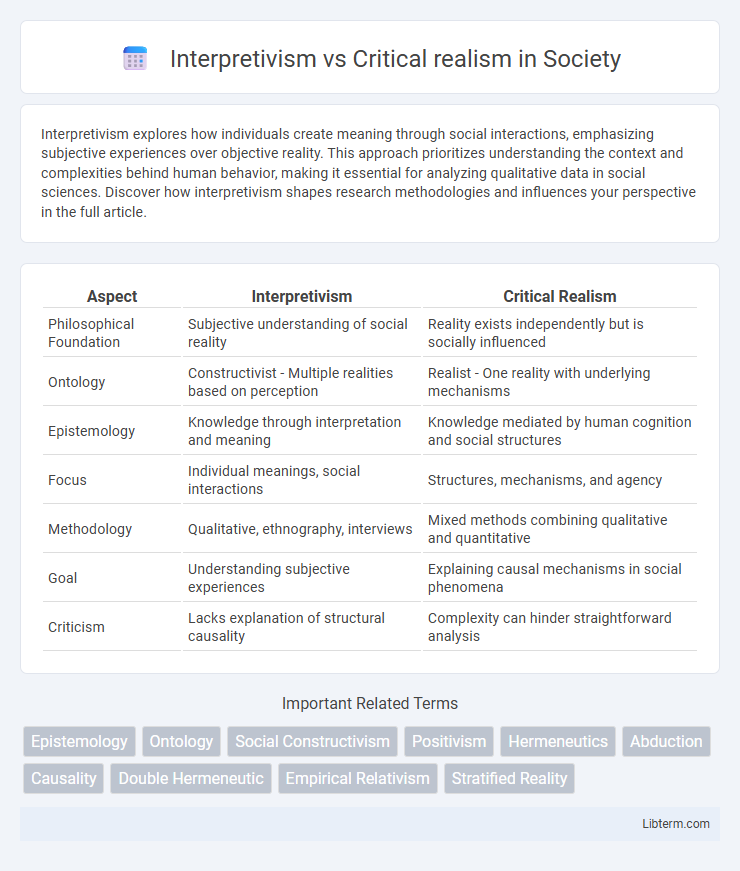Interpretivism explores how individuals create meaning through social interactions, emphasizing subjective experiences over objective reality. This approach prioritizes understanding the context and complexities behind human behavior, making it essential for analyzing qualitative data in social sciences. Discover how interpretivism shapes research methodologies and influences your perspective in the full article.
Table of Comparison
| Aspect | Interpretivism | Critical Realism |
|---|---|---|
| Philosophical Foundation | Subjective understanding of social reality | Reality exists independently but is socially influenced |
| Ontology | Constructivist - Multiple realities based on perception | Realist - One reality with underlying mechanisms |
| Epistemology | Knowledge through interpretation and meaning | Knowledge mediated by human cognition and social structures |
| Focus | Individual meanings, social interactions | Structures, mechanisms, and agency |
| Methodology | Qualitative, ethnography, interviews | Mixed methods combining qualitative and quantitative |
| Goal | Understanding subjective experiences | Explaining causal mechanisms in social phenomena |
| Criticism | Lacks explanation of structural causality | Complexity can hinder straightforward analysis |
Introduction to Interpretivism and Critical Realism
Interpretivism emphasizes understanding social phenomena through subjective experiences and meanings constructed by individuals, highlighting the importance of context and human interpretation. Critical realism combines ontological realism, acknowledging a reality independent of human perception, with epistemological relativism, recognizing that knowledge is socially constructed and fallible. Both paradigms challenge positivist approaches by focusing on deeper causal mechanisms and the complexity of social reality.
Defining Interpretivism: Key Principles
Interpretivism emphasizes understanding social phenomena through the meanings individuals assign to their experiences, highlighting subjective interpretation over objective measurement. Key principles include the importance of context, the recognition of multiple realities constructed by people, and the rejection of natural science methods in social research. This paradigm prioritizes qualitative methods such as interviews and participant observation to capture the complexity of human behavior.
Understanding Critical Realism: Core Concepts
Critical realism emphasizes the existence of an objective reality independent of human perception, while acknowledging that our knowledge of it is inevitably fallible and socially influenced. It distinguishes between the empirical (what we observe), the actual (events that occur regardless of observation), and the real (underlying mechanisms and structures causing events). This paradigm advocates for understanding deeper causal mechanisms beyond surface phenomena, combining ontology focused on stratified reality with epistemology recognizing human cognition and context.
Philosophical Foundations Compared
Interpretivism is grounded in the philosophy of idealism, emphasizing subjective human experiences and social constructions to understand reality through context-specific meanings. Critical realism, rooted in ontological realism and epistemological relativism, acknowledges an independent reality while recognizing that our knowledge of it is inevitably fallible and theory-laden. Both paradigms contrast in their approach to causality, with interpretivism favoring interpretative understanding and critical realism advocating for identifying underlying generative mechanisms.
Methodological Implications
Interpretivism emphasizes understanding social phenomena through the subjective meanings individuals assign, leading to qualitative methodologies such as ethnography and case studies that prioritize context-rich data. Critical realism, by contrast, combines ontological realism with epistemological relativism, advocating for the identification of underlying causal mechanisms using mixed methods that integrate both qualitative and quantitative data. Methodological implications of critical realism include iterative triangulation and retroduction to uncover generative structures, whereas interpretivism focuses on empathetic interpretation and co-constructed knowledge.
Epistemological Differences
Interpretivism emphasizes understanding social phenomena through subjective meanings and experiences, promoting relativist epistemology that knowledge is socially constructed. Critical realism asserts an ontological stance where reality exists independently of perception but acknowledges that our knowledge of it is fallible and theory-laden, supporting a stratified ontology with causal mechanisms underlying observable events. The epistemological difference lies in interpretivism's focus on context-specific knowledge versus critical realism's commitment to discovering underlying structures through scientific inquiry.
Ontological Perspectives
Interpretivism adopts a relativist ontology, emphasizing the subjective nature of reality as constructed through social interactions and individual experiences. Critical realism asserts a stratified ontology, recognizing a reality independent of human perceptions, yet acknowledges that our understanding is inevitably influenced by social and cognitive factors. These ontological perspectives shape how each paradigm approaches the nature of truth, existence, and the relationship between the observer and the observed.
Applications in Social Research
Interpretivism emphasizes understanding social phenomena through participants' subjective meanings, making it ideal for qualitative research in areas like cultural studies, education, and organizational behavior. Critical realism integrates both ontological realism and epistemological relativism, allowing researchers to explore underlying structures and causal mechanisms, which is particularly valuable in policy analysis, health sciences, and social inequalities research. Combining interpretivist insights with critical realist approaches enhances the depth and explanatory power of social research by capturing both lived experiences and objective social realities.
Strengths and Limitations of Each Approach
Interpretivism excels in capturing subjective human experiences, providing deep insights into social phenomena through qualitative data, but it faces limitations in generalizability and potential researcher bias. Critical realism combines ontological realism with epistemological relativism, allowing for the exploration of underlying structures and mechanisms beyond observable events, though it can be complex to operationalize and may require advanced methodological skills. Both approaches contribute valuable perspectives to social research, with interpretivism emphasizing meaning and context, and critical realism focusing on causality and the interplay of structure and agency.
Choosing Between Interpretivism and Critical Realism
Choosing between Interpretivism and Critical Realism depends on the research objective and the nature of reality being studied. Interpretivism emphasizes understanding human experiences and social contexts through subjective meanings, making it suitable for qualitative, exploratory research. Critical Realism, however, combines a recognition of an objective reality with an understanding of social structures' influence, ideal for studies seeking to explain underlying mechanisms and causal relationships.
Interpretivism Infographic

 libterm.com
libterm.com